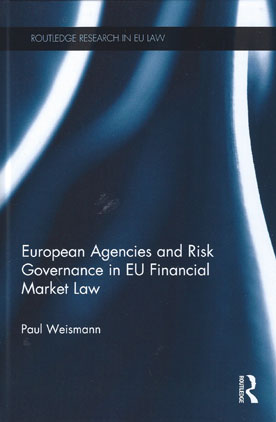
The phenomenon of 'agencification' describes the increasing use of European agencies by EU legislators to regulate various industries and institutions within the Union.
The creation of these decentralised administrative entities raise intricate questions regarding the limits to a delegation of powers, the relationship between independence and accountability, and the call for democratic legitimacy.
This book examines the developing use of agencies in EU legislation, focusing specifically on the Banking Union, and the three European Financial Market Supervisory Authorities (ESAs) which in comparison to other agencies possess unprecedented powers.
By exploring how these agencies work in the supervision of the banking sector, the securities sector and the insurance and occupational pensions sector, Paul Weismann asks whether the aggregation of new powers by European agencies has led to competencies moving from the Member State level to the EU level. As an evaluation of the developing centralisation of regulatory powers within the EU, this book will be of great interest and use to students and scholars of EU law, financial law and regulation, and European politics.